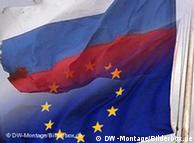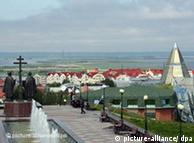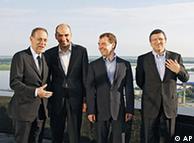Russia | 27.06.2008
Russia | 27.06.2008
Russia, EU Turn New Page on Bilateral Relations
Russia and the European Union on Friday announced the beginning of talks on a long-delayed strategic partnership accord, with Russian President Medvedev hailing a new chapter in their sometimes tense relationship.
The two sides, meeting in a concert hall in the oil-rich Siberian city of Khanty-Mansiysk, said negotiations would begin July 4 in Brussels on a new Partnership and Cooperation Agreement, an overarching treaty to replace an old accord that expired last year.
"Today we have opened a new page," 42-year-old Medvedev, who is seeking a thaw in the icy relations with the European Union that developed under his predecessor Vladimir Putin, said. He added that the new pact would open new horizons.
The talks offered EU leaders their first chance to assess Medvedev, who took office last month after previously serving as deputy prime minister and chairman of Russia's state-controlled gas giant Gazprom.
"A new chapter"
"I believe this new agreement should open a new chapter in our relations," European Commission President Jose Manuel Barroso told a news conference. "I particularly welcome President Medvedev's recent comments about strengthening the rule of law and working together as responsible members of the international community."
 Bildunterschrift: Großansicht des Bildes mit der Bildunterschrift: Ties between the EU and Russia may ease under Medvedev
Bildunterschrift: Großansicht des Bildes mit der Bildunterschrift: Ties between the EU and Russia may ease under Medvedev
Earlier, EU Commissioner for External Relations Benita Ferrero-Waldner said "Medvedev is very serious about cooperating more closely with the European Union."
Ferrero-Waldner stressed the EU's stance that the new EU-Russia partnership deal should set binding legal foundations for relations. The EU has clashed with Moscow over human rights, democracy and the separatist Georgian region of Abkhazia -- all issues raised at Friday's formal session.
Differences on new accord
The centrepiece of the three-hour meeting was the formal launch of negotiations on a new strategic agreement governing the sometimes strained relations between the EU and Russia, its third biggest trading partner.
Analysts say the negotiations will offer both sides a chance to size up the political will to overcome a host of problems in the energy and security sectors before a deal can be brokered.
Brussels-based diplomats hope Medvedev will prove a more flexible partner than his predecessor Vladimir Putin, whose bellicose line aggravated relations with the EU's post-Soviet member states.
Poland and Lithuania vetoed earlier attempts at an agreement because of bilateral trade rows and Russia's entanglement in the so-called frozen conflicts in Georgia and Moldova.
Medvedev has shown no inclination to exacerbate things, but press statements by his top advisors have criticized attempts by EU member states to "politicize" relations and manipulate the EU.
Both sides differ on what form a new agreement should take. Russia wants a more general plan mapped on the one which expired last year, while the EU insists on a more detailed pact, with precise wording on energy and security issues.
Energy, security issues take priority
 Bildunterschrift: Großansicht des Bildes mit der Bildunterschrift: View of the West-Siberian city of Khanty-Mansiysk, host of the summit
Bildunterschrift: Großansicht des Bildes mit der Bildunterschrift: View of the West-Siberian city of Khanty-Mansiysk, host of the summit
In his remarks Friday, Medvedev went into more specifics about the idea he first floated in Berlin for a common security structure for Europe outside of NATO, arguing that neither the western Alliance nor the Organization for Security and Cooperation in Europe were currently in a position to guarantee security for all of Europe.
"All issues of European security, including the planned US anti-missile defense, should be clarified together," Medvedev demanded, while reiterating calls for a pan-European security conference including participation by the US.
On other issues, the EU and Russia backed a new Baltic Sea pipeline -- a controversial issue within the EU -- which is to transport Russian natural gas to Germany.
Medvedev said the so-called Nord Stream project was a purely business venture which had been damaged by being politicized. Barroso demanded that the pipeline must meet environmental protection standards.
Ahead of the talks, EU foreign policy chief Javier Solana had remarked that "the whole complex of energy-related issues is one of the most important elements of our relations with Russia.
"It is an area where our interdependence is very strong, and it is only natural that this should be reflected in the new agreement," he said.
Russian officials said holding talks in oil-rich Khanty-Mansiysk was symbolic. The region accounts for about 40 per cent of the country's exports, of which the EU is biggest customer.
Russia, after the US and China, is the third-biggest foreign trade partner for the EU.

Comments